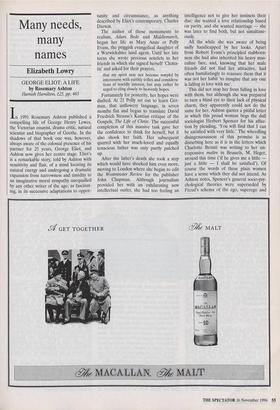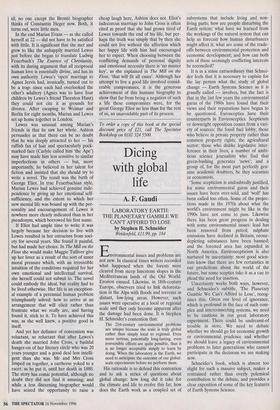Many needs, many names
Elizabeth Lowry
GEORGE ELIOT: A LIFE by Rosemary Ashton Hamish Hamilton, f25, pp. 465 In 1991 Rosemary Ashton published a compelling life of George Henry Lewes, the Victorian essayist, drama critic, natural scientist and biographer of Goethe. In the shadows of that book one was, however, always aware of the colossal presence of his partner for 25 years, George Eliot, and Ashton now gives her centre stage. Eliot's is a remarkable story, told by Ashton with sensitivity and flair, of a mind locating its natural energy and undergoing a dramatic expansion from narrowness and timidity to an imaginative moral sympathy unequalled by any other writer of the age; as fascinat- ing, in its successive adaptations to oppor- tunity and circumstance, as anything described by Eliot's contemporary, Charles Darwin.
The author of those monuments to realism, Adam Bede and Middlemarch, began her life as Mary Anne or Polly Evans, the priggish evangelical daughter of a Warwickshire land agent. Until her late teens she wrote precious notelets to her friends in which she signed herself 'Clema- tis' and asked for their prayers,
that my spirit may not become warped by intercourse with earthly trifles and considera- tions of worldly interest, but may rather be urged to cling closely to heavenly hopes.
Fortunately for posterity, her hopes were dashed. At 21 Polly set out to learn Ger- man, that unflowery language, in seven months flat and began to translate David Friedrich Strauss's Kantian critique of the Gospels, The Life of Christ. The successful completion of this massive task gave her the confidence to think for herself, but it also shook her faith. Her subsequent quarrel with her much-loved and equally tenacious father was only partly patched up.
After the latter's death she took a step which would have shocked him even more, moving to London where she began to edit the Westminster Review for the publisher John Chapman. Although journalism provided her with an exhilarating new intellectual outlet, she had too feeling an intelligence not to give her instincts their due: she wanted a love relationship based on parity, and she wanted marriage — she was later to find both, but not simultane- ously.
All the while she was aware of being sadly handicapped by her looks. Apart from Robert Evans's principled stubborn- ness she had also inherited his heavy mas- culine face, and, knowing that her male friends did not find her attractive, had often humiliatingly to reassure them that it was not her habit 'to imagine that any one is falling in love with me'.
This did not stop her from falling in love with them, but although she was prepared to turn a blind eye to their lack of physical charm, they apparently could not do the same for her. Ashton quotes a pitiful letter in which this proud woman begs the dull sociologist Herbert Spencer for his affec- tion by pleading, 'You will find that I can be satisfied with very little.' The wheedling disingenuousness of this promise is as disturbing here as it is in the letters which Charlotte Brontë was writing to her un- responsive maitre in Brussels, M. Heger, around this time Cif he gives me a little just a little — I shall be satisfied'). Of course the words of these plain women have a sense which they did not intend. As Ashton notes, Spencer's general socio-psy- chological theories were superseded by Freud's schema of the ego, superego and id; no one except the Brontë biographer thinks of Constantin Heger now. Both, it turns out, were little men.
In the end Marian Evans — as she called herself at 22 — did not have to be satisfied with little. It is significant that she met and grew to like the unhappily married Lewes just before she began to translate Ludwig Feuerbach's The Essence of Christianity, with its daring argument that all reciprocal human love is essentially divine, and has its own authority. Lewes's 'open' marriage to Agnes Jervis had, ironically, turned out to be a trap: since each had overlooked the other's adultery (Agnes was to have four children by Lewes's friend Thornton Hunt) they could not cite it as grounds for divorce. After escaping to Weimar and Berlin for eight months, Marian and Lewes set up home together in London.
Lewes was unusual among Marian's friends in that he saw her whole. Ashton persuades us that there can be no doubt that he was deeply attracted to her — his raffish fan of hair and spectacularly pock- marked face (Carlyle called him 'the Ape') may have made him less sensitive to similar imperfections in others — but, more importantly, he believed in her talent for fiction and insisted that she should try to write a novel. The result was the birth of George Eliot. In true Feuerbachian style, Marian Lewes had achieved genuine inde- pendence by giving up her emotional self- sufficiency, and the extent to which her new mental life was bound up with the per- sonality and encouragement of Lewes is nowhere more clearly indicated than in her pseudonym, which borrowed his first name.
If Eliot had ample time to write it was largely because her decision to live with Lewes resulted in her ostracism from soci- ety for several years. She found it painful, but had made her choice. In The Mill on the Floss she would make Maggie Tulliver give up her lover as a result of the sort of inner moral pressure which, with an irresistible intuition of the conditions required for her own emotional and intellectual survival, she herself could not submit to. The novel could embody the ideal, but reality had to be lived otherwise. Her life is an exception- al example of a perennial human problem triumphantly solved: how to arrive at an arrangement that will elicit rather than frustrate what we really are, and having found it, stick to it. To have achieved this was, as she well knew, a positive good in itself.
And yet her defiance of convention was reluctant, so reluctant that after Lewes's death she married John Cross, a bashful hanger-on of her literary circle who was 20 years younger and a good deal less intelli- gent than she was. Mr and Mrs Cross limped on together, a carthorse yoked to a racer, as he put it, until her death in 1880. The story has comic potential, although no doubt they did not find it amusing; and while a less discerning biographer would have seized the opportunity to raise a cheap laugh here, Ashton does not. Eliot's indecorous marriage to John Cross is often cited as proof that she had grown tired of Lewes towards the end of his life, but per- haps the truth was simply that by then she could not live without the affection which her happy life with him had encouraged her to expect. When choosing between the conflicting demands of personal dignity and emotional necessity there is `no master key', as she explained in The Mill on the Floss, 'that will fit all cases'. Although her attempt to live a good life involved consid- erable compromises, it is the generous achievement of this humane biography to show that far from being a negation of such a life these compromises were, for the great George Eliot no less than for the rest of us, an unavoidable part of its process.
To order a copy of this book at the special discount price of £21, call The Spectator Bookshop on 0181 324 5500.



















































































 Previous page
Previous page